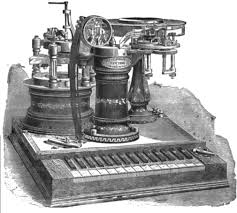telegraph
英 [ˈtel.ɪ.ɡrɑːf]
美 [ˈtel.ə.ɡræf]
- n. [通信] 电报机,电报
- vt. 电汇;流露出;打电报给…
- vi. 打电报
使用频率:

记忆方法
1、tele- "far" + graph-.
2、字面含义为:that which writes at a distance.
2、字面含义为:that which writes at a distance.
中文词源
telegraph 电报
tele-,远的,-graph,写。引申词义电报。
英语词源
- telegraph (n.)
- 1794, "semaphor apparatus" (hence the Telegraph Hill in many cities), literally "that which writes at a distance," from French télégraphe, from télé- "far" (from Greek tele-; see tele-) + -graphe (see -graphy). The signaling device had been invented in France in 1791 by the brothers Chappe, who had called it tachygraphe, literally "that which writes fast," but the better name was suggested to them by French diplomat Comte André-François Miot de Mélito (1762-1841). First applied 1797 to an experimental electric telegraph (designed by Dr. Don Francisco Salva at Barcelona); the practical version was developed 1830s by U.S. inventor Samuel F.B. Morse (1791-1872). Meaning "telegraphic message" is from 1821. Related: Telegraphy.
- telegraph (v.)
- 1805, from telegraph (n.). Figurative meaning "to signal one's intentions" is first attested 1925, originally in boxing. Related: Telegraphed; telegraphing.
权威例句
- 1. The Telegraph puts the union in a historical perspective.
- 《电讯报》从历史的角度对该工会进行了报道。
- 2. I ghosted his weekly rugby column for the Telegraph.
- 我为他代写《电讯报》每周的橄榄球专栏。
- 3. Mather was film critic on the Daily Telegraph for many years.
- 马瑟多年来一直担任《每日电讯报》的影评人。
- 4. Developments in South Africa receive extensive coverage in The Sunday Telegraph.
- 《星期日电讯报》全面报道了南非的发展。
- 5. He did not bother to punctuate the telegraph message.
- 他没有费心在电文中加标点.
